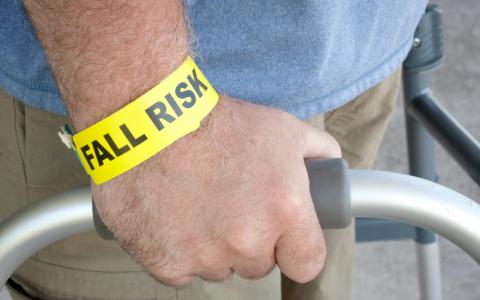Balance Problems Raise the Risk of Falls
Why do seniors fall, and what can be done? Risk factors include physical and mental changes as we age, environmental hazards, and the side effects of medications. Seniors are advised to report falls to the doctor, and to discuss their fall risk even if they haven’t fallen. Many falls are due to balance problems that a senior may or may not be aware of. Balance problems may be caused by:
Vision changes. Age-related macular degeneration, cataracts, glaucoma and other vision problems not only make it more likely that we will trip over something because we can’t see it, but also reduce our sense of balance and orientation in space.
Inner ear problems. Our ears do more than hear. The vestibular system, important for our sense of position and balance, is located in the inner ear as well. Normal changes of aging, bacterial or viral infections, certain conditions such as Meniere’s disease and benign paroxysmal positional vertigo (BPPV), and even ear wax buildup can cause dizziness and loss of balance.
Changes to the blood vessels. Over time, our blood vessels lose their elasticity. So when we change position, such as from sitting to standing, we can become dizzy and lightheaded and even pass out. The cause might be as simple as dehydration, or a more serious health problem such as diabetes, stroke, heart problems or Parkinson’s disease.
Numbness in legs and feet. Diseases such as diabetes, as well as some of the normal changes of aging, make it harder for our nerves to send messages to the brain about exactly where our feet and legs are, and about the surface we’re standing on—is it uneven? Slanted? Are we standing on the edge of a curb or stair?
Medication side-effects. Alone or combined with other drugs, many of the medicines seniors take can cause dizziness. Blood pressure medications in particular can cause unsteadiness. Sedatives, sleep medications, some heart medications, antidepressants, pain medications and even some herbal products also can affect our sense of balance. Drinking alcohol often increases the effect.
This is only a partial list of conditions that can affect our sense of balance. Some causes of balance problems are treatable. In other cases, there are things we can do to cope with the problem and be safer. The doctor can diagnose the problem or problems, provide an individualized treatment plan, and recommend an overall fall-protection program that might include regular eye exams, a home inspection, plenty of exercise to preserve muscle strength and flexibility, and special balance activities such as tai chi.
